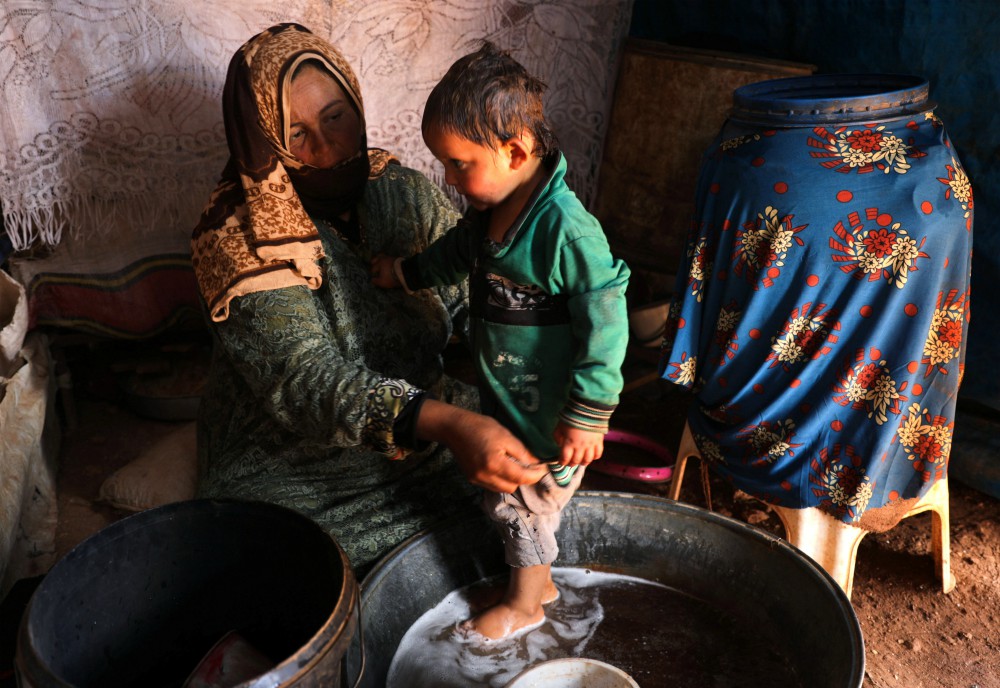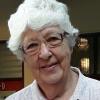
Fawza Umri helps her son put on clothes after being bathed inside their tent at Atmeh refugee camp, near the Turkish border in Syria, on June 13. (CNS/Reuters/Khalil Ashawi)
A few weeks ago, an "essential service" large truck came to our place. "Essential services" are those services identified by our government as critical, as New Zealand copes with the impact of COVID-19. The cleaning of septic tanks had rightly been identified as an essential service. Our septic tank was to be vacuumed out. Because we live in a rural area, we are not connected to the city sewage works — hence the need for cleaning every three or four years.
This triggered off a funny memory for me. In the early 1980s when I was much younger, I had gone to work in Papua New Guinea, and inculturation was the name of the game for new missionaries.
All I remember of the obligatory inculturation workshops was an impassioned plea from priests, brothers and the village men who helped around the compound with some of the heavier duties. We women were to be very careful about what we flushed into the septic tanks. In Papua New Guinea then, there was no such thing as a large truck that easily and quickly vacuumed out tanks. Instead, everything had to be shoveled out and hence the injunction — indeed command — of the priests, brothers and other assorted men to us women to be careful about what we flushed away. I am hoping this does not need further clarification for Global Sisters Report readers!
Good sanitation is key to ensuring good health. During these days of pandemic, I have received emails from sisters in Asian and African provinces of our congregation, the Sisters of Our Lady of the Missions. I have visited some of these provinces and am only too aware of how lucky I am to live in New Zealand, one of the wealthiest countries in the world. I think of other countries where all too often gutters, rivers and fields serve as toilets for so many. In particular, I think of the health hazards that these will become in a world fighting COVID-19.
Although COVID-19 first appeared in China, what has been fascinating about its journey after that was that it took up residence in wealthier countries of the world, whether in Australia, or Europe or North America, or on cruise ships. In other words, it seemed to take foothold in places where a number of people had significant discretionary spending ability. They could travel in planes, on cruise ships, which sadly became virtual petri dishes that could culture COVID-19 very rapidly indeed, and they could frequent expensive restaurants and cafés.
Advertisement
It has now moved on fairly rapidly to the African, Asian and Latin American continents, and is finding a home in those parts of the world where few people are able to indulge in discretionary spending, where health services are often quite poor, and where poor sanitation is all too often the name of the game.
This reality surfaces another problem. In late 2019, early 2020 in New Zealand, there was a measles epidemic that infected more than 2,000 people, usually children, two of whom died. At the same time, there was a measles epidemic in the Democratic Republic of the Congo in which more than 7,000 died. We heard nothing of this in New Zealand.
Indeed, Africa rarely features in popular media in the Western world. Will our Western media be updating us on what is happening in such places or will it continue to concentrate on the truly alarming statistics coming out of the United States, the United Kingdom, Russia and Brazil?
As one of our sisters in Bangladesh emailed me: "What will happen in the Rohingya refugee camp if the virus gets in there?" In one refugee camp, access to bathing and washing is limited to 151 facilities for 25,000 people. This situation is the norm rather than the exception. But in countries such as New Zealand more and more people regard en suite bathrooms and bedrooms as normative. COVID-19 reveals the ugly face of inequality in so many different ways and in so many different countries.
I wonder, too, what might happen in Dhaka, Bangladesh's capital city with its population of 21,000,000, many of them eco-refugees from farther south in the country. What we take for granted in a country like New Zealand — good, effective and reliable sanitation even during critical moments such as we are experiencing now — is not going to happen for these people, or for those in refugee camps in Bangladesh or Syria.
In John's wonderful story of the encounter of Jesus with the Samaritan woman (John 4:4-26), Jesus explains to her that he could be "living water" for her in her somewhat dysfunctional life. COVID-19 requires us, who in many ways are the beneficiaries of inequality, to see how we can be "living water" for our sisters and brothers, the victims of structural inequality.
[Susan Smith, a Sister of Our Lady of the Missions, has been involved in education and formation programs in New Zealand, Australia, Italy, the Philippines, Papua New Guinea and France. Currently, she volunteers as a budget adviser, helps with an emergency housing trust and some environmental groups, and writes for publication.]







